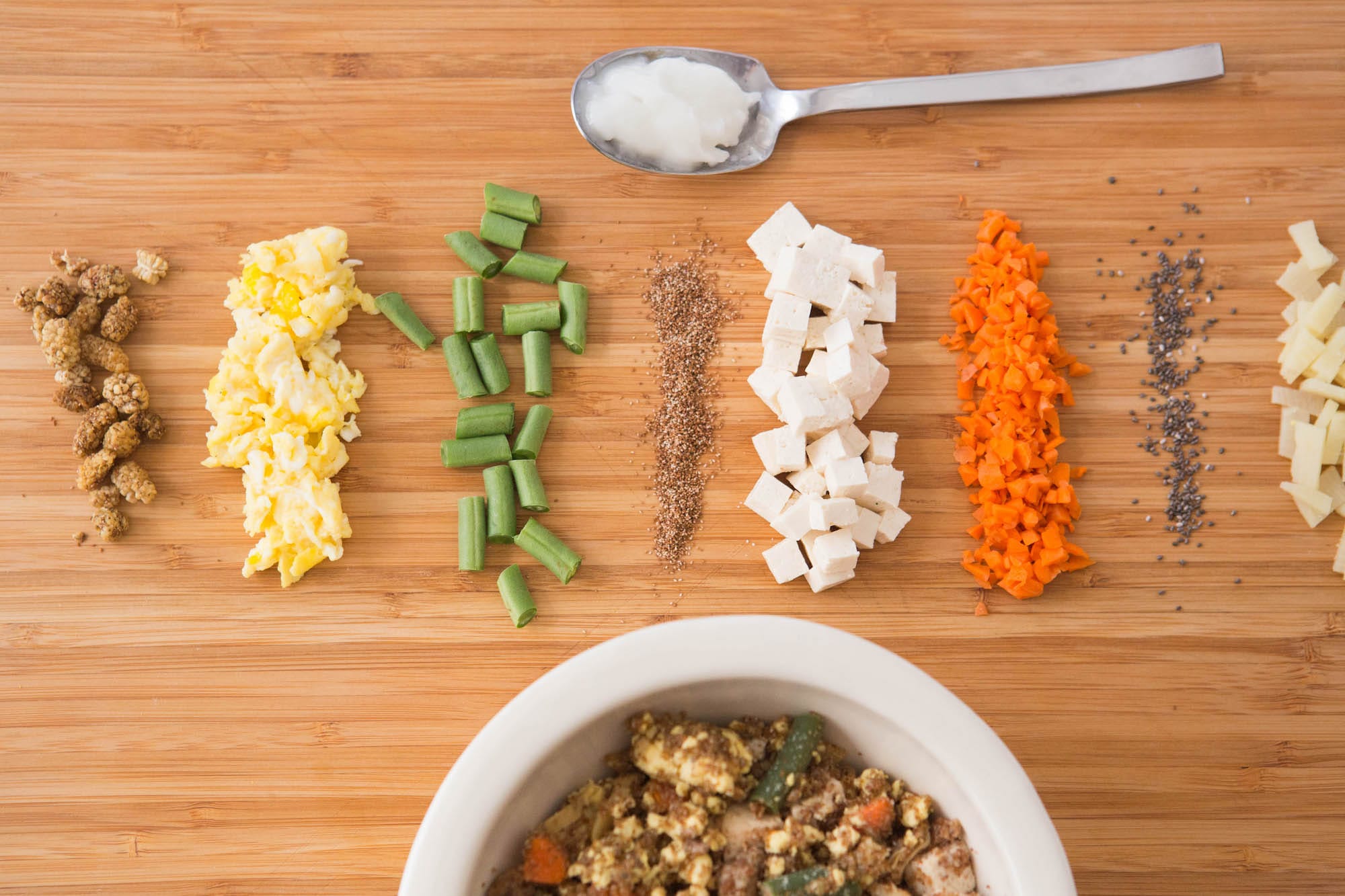Nom Nom Blog
Vitamins and minerals required in dog nutrition
When we talk about dog food as being "balanced and complete", it means they include the essential vitamins and minerals our dogs' bodies need to function optimally. But how many of us know which nutrients our dogs rely on to stay healthy and happy and how should we as pet owners best incorporate these essential vitamins and minerals in the right proportion?
We've outlined some best practices for pet owners on how to infuse dog food with the proper vitamins and minerals and we've listed them out with information on how they work in your dog's body! Each of our fresh dog food recipes includes the essential vitamins and minerals outlined below.
How to infuse your dog's diet with essential vitamins & minerals?
Being a pet parent means constantly learning about our pet's nutritional needs, and discovering what we can do to best satisfy them!
- Rely on whole foods. A majority of vitamins and minerals should be found in whole meats, vegetables, and oils in the diet, with only slight additions to ensure a complete diet. Highly-processed diets tend to lose many natural sources of vitamins and minerals in production and are less likely to naturally supply these nutrients. If you're needing to add your own vitamins and minerals to your dog's food, that's a sign to switch to a different diet-- you shouldn't have to add any nutrients on your own.
- Do not prepare your own dog food, unless advised by a veterinary nutritionist. DIY homemade dog food recipes seem like a healthy solution to kibble but are often lacking in nutrients. Only prepare your dog's food yourself if following a recipe created by a veterinary nutritionist who specializes in fresh recipes. Chicken and rice diets are not balanced, nor complete, and DIY raw diets can be flat out dangerous when prepared on your own.
- Do your research. Rather than going to the store and trying to assess the nutritional value in real time, do your research at home first. If you can't find sufficient nutritional information posted anywhere, contact the company directly. You shouldn't feed your dog anything you aren't sure about and should clarify that a diet includes all the essential vitamins and minerals listed above.
Vitamins and Minerals Your Dog Needs
You need them in your dog's main diet, but you can also use many of these sources as healthy snacks! Our in-house pet health experts formulated a nutrient mix that we add to all of our recipes to ensure the highest quality nutrition.
Vitamins
- Vitamin A
- Found in: Carrots, spinach, sweet potatoes, fish oil, & eggs.
- Benefits: Weight loss, fights disease, eye & skin health
- Vitamin B
- Found in: Whole grains (such as brown rice or teff), green vegetables, & beans.
- Benefits: Aids in cell growth & development
- Vitamin C
- Found in: Many fruits & vegetables, such as potatoes, green beans & zucchini.
- Benefits: Immune boosting promotes healing & fights illness
- Vitamin D
- Found in: Fish oil, egg yolks, beef & cottage cheese.
- Benefits: Strengthens bone & teeth
- Vitamin E
- Found in: Leafy green vegetables (like kale), seeds (such as chia seeds), & whole grains.
- Benefits: Eye & skin health, a powerful antioxidant
- Vitamin K
- Found in: Leafy green vegetables, cabbage & fish.
- Benefits: Blood-clotting keeps bones strong
Minerals
Minerals come from a variety of sources and play unique roles in conjunction with the essential vitamins listed above.
- Calcium & Phosphorus
- Found in: Tofu, green beans, broccoli, and cauliflower (calcium). Meats, eggs & fish (phosphorus)
- Benefits: Blood coagulation, muscle growth and nervous system function in dogs
- Caution! Too much can cause fractures, bone deformities, & weakness. Too little can lead to abnormal growth & development
- Potassium, Sodium & Chloride
- Found in: Fruits, vegetables, and grains.
- Benefits: Control the balance inside and outside the body's cells. Assists in the function of muscles, nervous system & heart. Chloride helps in the production of stomach acid.
- Caution! Imbalances can lead to weakness, hair loss, dehydration and in some instances, paralysis. A deficiency in potassium means abnormal heartbeat
- Magnesium
- Found in: Nuts, whole grains, and leafy vegetables.
- Benefits: Aids in muscle and bone development. Helps with calcium absorption
- Caution! Magnesium, calcium & phosphorus are joined in pet health harmony. One cannot function without the other.
- Sulfur
- Found in: Eggs, fish, meat & molasses.
- Benefits: Beautiful hair, nails & skin.
- Iron
- Found in: Red meats, fish, poultry, eggs, and legumes.
- Benefits: Oxygenating red blood cells, strengthening the immune system & production of energy.
- Zinc
- Found in: Eggs, pork, liver, brewer's yeast, and lamb meat.
- Benefits: Boosts immune systems, aids in healthy hair and skin. Protein digestion.
- Iodine
- Found in: Seafood, dairy, and kelp.
- Benefits: Production of thyroid hormone for metabolism.
- Selenium
- Found in: Seafood, meat, brown rice, and vegetables.
- Benefits: Paired with vitamin E to promote the immune system.
- Copper
- Found in: Seafood, whole grains, seeds, and legumes.
- Benefits: Bone growth & promotes the use of iron.


